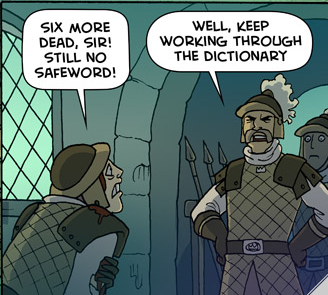Wittgenstein, Tractatus Logico-Philosophicus #6.54
My Propositions serve as elucidations in the following way: anyone who understands me eventually recognizes them as nonsensical, when he has used them — as steps — to climb beyond them. (He must, so to speak, throw away the ladder after he has climbed up it.)
He must overcome these propositions, and then he will see the world aright.
Sun Tzu, The Art of War, Chapter XI #38
At the critical moment, the leader of an army acts like one who has climbed up a height and then kicks away the ladder behind him. He carries his men deep into hostile territory before he shows his hand.
I haven’t heard or seen too many uses of the concept of “throwing away the ladder.” It seems interesting, though coincidental, that it shows up in these two places.
Wittgenstein is discussing the end of philosophy, how once you understand his statements in the Tractatus, you will understand how to move beyond thinking in those terms. And then everything will be solved.
Sun Tzu, on the other hand, is discussing how a leader can get the most out of those under her command by preventing retreat. The famous examples are of Hsiang Yu, and later Cortez, who burnt their ships behind them to prevent mutiny and ensure that their troops would fight as if their lives depended upon it (because they did).
Sun Tzu and Wittgenstein may be two of the most commented upon authors of all time. However, I don’t think either could have the other’s meaning in these passages, or at least I’ve never seen any commentary to that effect. However, this does not mean there is nothing to be learned:
For Wittgenstein, the recognition of the nonsensical is what is doing the work. His words are nonsensical and the realization of this is what allows you to move beyond them, to something better (says he). So by doing as he says, by recognizing his words as nonsensical, your retreat is prevented, because no one, save a mad man, would willingly return to a nonsensical philosophy when a better one exists. By climbing the ladder, you also discard it.
Compare this to Philosophical Investigations #309:
What is the aim in philosophy?– To shew the fly the way out of the fly-bottle.
The fly-bottle, a supposedly one way process, Wittgenstein is trying to walk back… In the Philosophical Investigations he’s trying to climb down the discarded ladder.



I just read a commentary on another website, night rpm, about Wittgenstein’s proposition 6.54 that compared his statement with statements by Chuang Tzu. Wittgenstein basically says that once we have climbed his ladder of words, and the ladder has been proved useless, we pull it up behind us. There is no sense in the words, but it leads us to discovery and understanding nonetheless, something beyond words, but we are led to it by the senseless words. The blogger compared Wittgenstein’s proposition to Chuang Tzu’s statement that we use a fish trap to catch a fish, and then discard the trap, because we are searching for the fish, we use a rabbit snare to catch a rabbit, and then discard the snare, because we are searching for a rabbit. We use words to find the meaning, but we are not searching for words, we are searching for meaning. Maybe we need to set the fish and rabbit free too, use the words, find the meaning, go beyond both, and value words and meaning as we discover and use them….